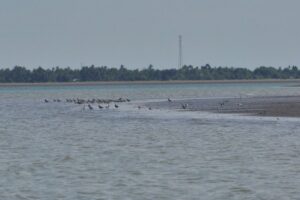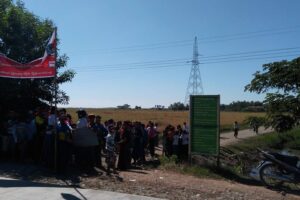Kay Zue (Laywaddy FM)
“We are no longer make a living on this island; fishing in the water is no longer possible. The navy constantly monitors us, and they shoot and kill us when they found us in the water. We are here to live just on this island and just have to die with starving!”
The residents of the small island, known as Maday Island in Kyauk Phyu Township, Rakhine State, have lived there since ancient times, passing down their way of life from generation to generation. The nearby waters of this island were once rich with abundant fishery resources, and various species of fish, prawns, and crabs could be found everywhere, said Ko Maung Chay. Moreover, this island serves as a vast garden for its inhabitants. They get fruits and vegetables for cooking from its land, while the expansive sea surrounding them has always been their lifeline. However, they are now on the brink of abandoning their traditional livelihoods. Unfortunately, for individuals like Ko Maung Chay and his family, they are already facing starvation, unwilling to venture beyond the confines of this island.
“In the past, such periods like during these days of a year, were flush with money. We could afford to let our children eat whatever they liked, and we bought new school uniforms for them. Although we weren’t not rich, our family had a sufficient income.”
Ko Maung Chay’s family is not alone in facing such dire circumstances of being trapped and suffering from starvation. There are four villages inhabited by indigenous Rakhine ethnic people on this island, known as Maday Island. With a population of over 3,000 across 760 households, the island hosts approximately 700 houses. These households are situated within the project area where the Myanmar and Chinese regimes are jointly developing a deep seaport.
“When we caught fish and prawns, we went to Kyauk Phyu Town to sell them. All the seafood, including the fish and prawns consumed in Kyauk Phyu Town, came from the waters around Maday Island. We fished throughout the night, and the following morning, we carried our catch by boat and sold them in Kyauk Phyu Town.”
All the fish (and prawns) that we catch from the water areas around the island not only suffice for consumption within the villages, where most residents are fishermen, but also contribute to the nutritional needs of Kyauk Phyu Town’s population of over 70,000. The island is situated along the Thanzit River, which serves as one of the major a water outlet from Rakhine State to the sea. The villagers primarily rely on the Thanzit River for their livelihoods. However, news of the project to construct a deep seaport in their fishing areas has alleviated the concerns among those over 3,000 residents.
We’ve heard that crude oil tankers will be docking here. Unfortunately, access to that area is now restricted and the navy patrols are everywhere. As a result, we no longer have a place for fishing. How can we survive if we’re unable to access these water areas?
The Kyauk Phyu Deep Seaport project holds significance not only for China but also for the Myanmar regime, which believes it could generate substantial revenue for the country. In fact, Kyauk Phyu Township in Rakhine State has already been significantly contributing to the regime’s income through the natural gas pipeline that originates on its land.
In addition to these projects, power plants capable of generating 300 megawatts each using natural gas are also under construction. Within the mega project, two deep seaports will be developed on a vast land spanning 643.88 acres. Furthermore, a bridge connecting Maday and Ramree Islands will be included in this ambitious undertaking.
A railway and highway connecting Mandalay and Kyauk Phyu will be part of the project. The total cost for this deep seaport project is expected to reach approximately 7 billion USD, and it will be developed in three phases, as outlined in a press statement by the regime. The initial phase involves constructing the deep seaport on Maday Island at an estimated cost of 1.3 million USD.
This project is currently being jointly implemented by China’s state-owned CIDIC Group and Myanmar’s consortium company, Kyauk Phyu Special Economic Zone Deep Seaport Company Limited. China will hold 70 percent of the shares, while the Myanmar side will own the remaining 30 percent.
As this deep seaport project could harm the livelihoods of many fishermen along the Thanzit River, the responsible parties must prepare to create job opportunities that can properly replace the traditional ways of life for local inhabitants.
However, the junta regime and Chinese investment companies have no such preparations, as well as they lack transparency in development processes, said Ma Mee Mee. She has been working at the Ministry of Natural Resources and Environmental Conservation under the junta regime and is now a participant in the Civil Disobedience Movement (CDM).
“The deep seaport projects and natural gas extraction projects are still being developed without considering their environmental impacts. During my time as a regime staff member in Sittwe, I observed that neither I nor my colleagues were well-informed about these projects. Furthermore, there is a lack of transparency surrounding them. Even regime staff directly involved in these projects face limitations in conducting inspections. In the project area, Chinese flags are prominently displayed. If project management remains inadequate, our country and its residents will bear the brunt of the consequences. The residents could find themselves trapped in a vast, toxic pond. It is essential to recognize the potential damages associated with this project.”
Ko Maung Chay’s family is unaware of the significance of their inherited land for both the Chinese and Myanmar regimes. They remain uncertain about how their fishing plots will be affected by this mega project. Despite facing the prospect of no longer being able to fish in the vast sea area, the island’s inhabitants continue to struggle for survival, hoping for empathy.



